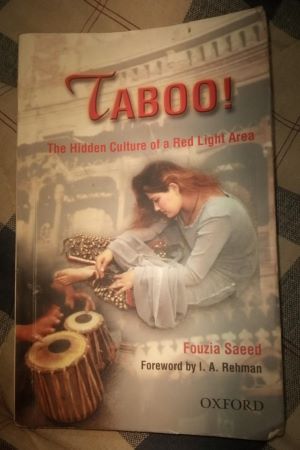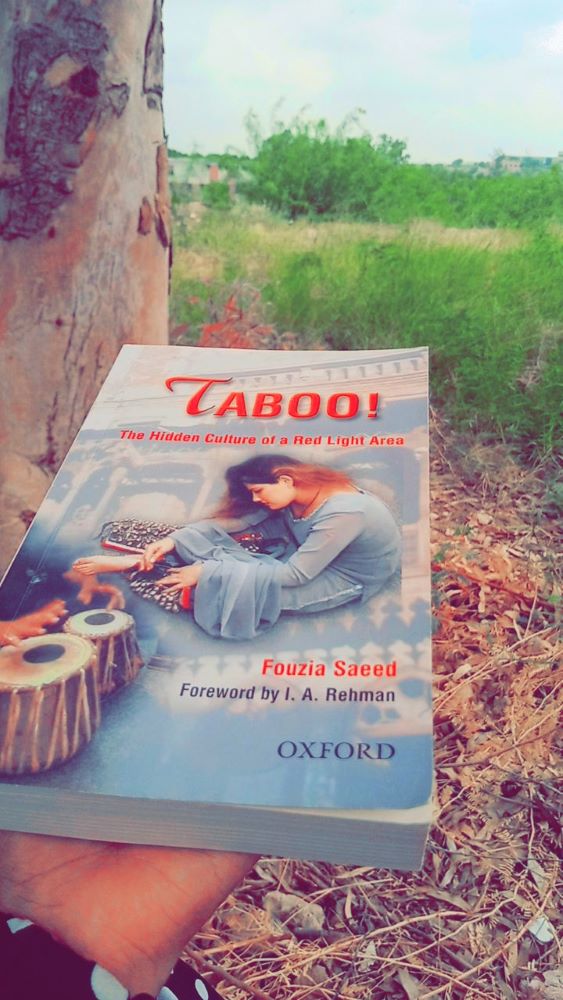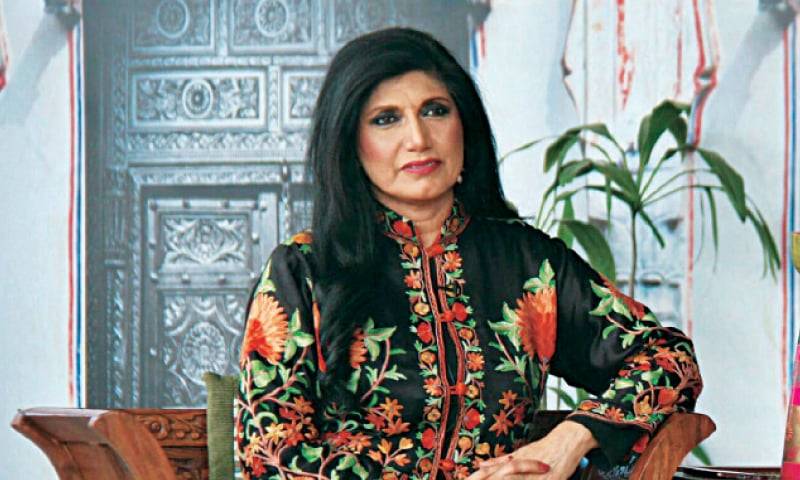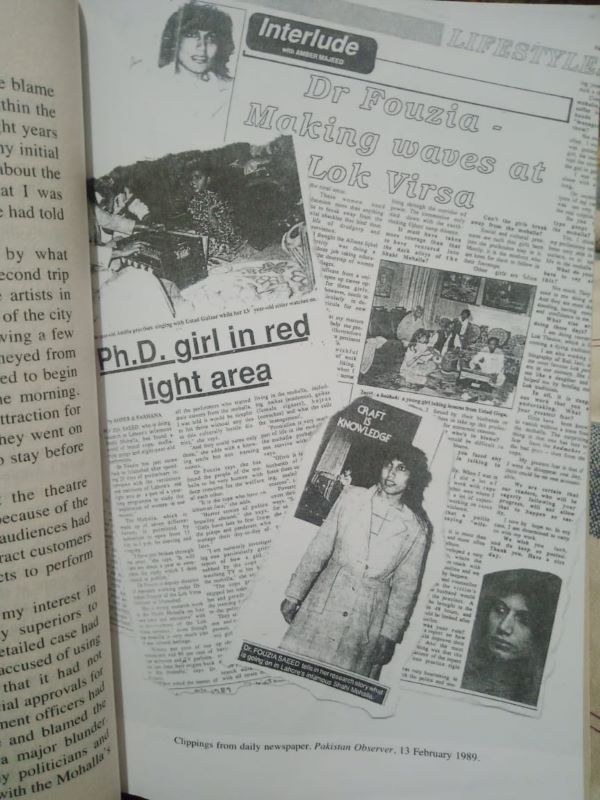
A student of anthropology reviews the famous book ‘Taboo’, authored by Dr. Fouzia Saeed
Syeda Anmol Ali
Dr. Fouzia Saeed has written extensively on Pakistani culture and social issues, and for that reason, her 2001 ethnography of the walled city of Lahore – Taboo, retains a cult-like following in five languages. Taboo is the true story of her successful efforts to counter sexual harassment in her own career, inspiring many who work on this problem today.
Dr. Fouzia earned her PhD from the University of Minnesota. Her unique perspective stems from her many roles as a social activist, a development professional, a successful manager, and an accomplished scholar. She spent over 30 years on social change in Pakistan. While writing her five books, she also created Pakistan’s first women’s crisis center, successfully advocated for the passage of seven laws for women’s rights, including two against sexual harassment, and revitalized Lok Virsa, Pakistan’s Institute of Folk Heritage.
International organizations have frequently acknowledged her work. The World Movement for Democracy produced a film on her life, entitled ‘I Was Not Alone’.
Her book ‘Taboo’ is a journey of discovery into the infamous red light district of Lahore, known as the Shahi Mohalla (the Royal Locality), or Heera Mandi (the market of diamonds).
 The phenomenon of prostitution coupled with music and dance performances had ancient roots in South Asia. Regardless of the stigma attached to prostitution, it has given birth for centuries to many well-known performing artists. The book paints a more realistic picture of the phenomenon through the stories of the people living the musicians, the prostitutes, and their pimps, managers and customers.
The phenomenon of prostitution coupled with music and dance performances had ancient roots in South Asia. Regardless of the stigma attached to prostitution, it has given birth for centuries to many well-known performing artists. The book paints a more realistic picture of the phenomenon through the stories of the people living the musicians, the prostitutes, and their pimps, managers and customers.
Dr. Fouzia worked tirelessly to write this novel and made it successful. In order to understand some Punjabi words written in 33 chapters of this novel, Fouzia wrote a glossary portion in the beginning of the book which was the plus point of this book. Through the pictures of the area, Fouzia has explained all the locations and scenes mentioned in her novel.
Because of her ethnographic work, she had lost her job and also she was targeted by a journalist who published her picture on front page of a newspaper captioned as “Ph.D. girl in red light area’, but she did not stop and continued her work.
In Taboo she has shown the bond between cultures, enculturation and acculturation impacts on society and shared history of migration and cultures in India and Pakistan, which also promotes humanism by her writing strength. She also noticed minor things like how the customs are performed there. What is the importance of education there? What is the gender structure? How is the class system organized? How the professions are related to each other and how they are learned.

Dr. Fouzia has elaborated the art work of Mohalla very well. This include the wood work inside of houses, metal work, management of rooms, music, dancing, singing, musical instruments and their beauty, jewelry, dresses. Actually, she shows through her novel the mohalla as an artistic world.
She has thoroughly discussed the structures and architecture of Red Light Area – the buildings, houses, streets, and shops. The ‘kotha’ and ‘kothi khanas’ – the large and small baithaks or sitting places, policing, life routine of the ‘Mohalla’ people, the relation and roles of professional people and groups including actress, singers, dancers and prostitutes. Not only these major professions but also ‘gajra seller” the flower seller, money-changer guys (who used to change big currency notes of costumer for showing their wealth at the time of performance), paan seller, private agents of kotha, marriage and values of prostitute have been narrated in detail. Famous Pakistani singer Noor Jahan Begum also belonged to Shahi Mohalla.
Dr. Fouzia has discussed in depth their personal life and good or bad experiences, how they (prostitutes) make costumers happy, role of their gender and education in their profession, and also how the people treat them after knowing there professions with very positive attitude and make them sure that they are secure and having no issue about their identity.
Also read: Anthropological Perspective of Human Rights
There many traditions are performed different ways which have their own values. The tradition of ‘Nath utrwayi’ or ‘khulai’ is considered very significant tradition in kotha, which in fact is ‘neelami’ or auction. In this tradition a young and virgin girl is sent to kotha khana for nath khulai and a rich person offer her nath khulai in high rate. After nath khulai she becomes professional prostitute. Also ‘sold marriages’ or ‘contract marriages’ are performed here.
The author has also focused on political conditions of that time, and relation of politicians, their efforts and fair or unfair behavior because of their professions. They have faced many issues at the time of Gen. Zia’s regime. The novel also mentions the man and women of kotha having their own campaigns and leagues for gaining there rights.
Dr. Fouzia writes about some famous places of Lahore located near ‘Mohalla’ and having central referral contact with it like Taxali Gate, Shahi Qila – the royal fort of Lahore.
 In this book – Taboo, Fouzia shares some stories of singers, prostitutes, and ladies who are not the part of professions but their men are involved in the groups like drum beating, private agents of kotha, singing Ustads etc.
In this book – Taboo, Fouzia shares some stories of singers, prostitutes, and ladies who are not the part of professions but their men are involved in the groups like drum beating, private agents of kotha, singing Ustads etc.
Every story is important and interesting. It is not possible to discuss every story here, so I have chosen the story of Laila, a woman forcedly brought into the prostitution, her step mother and story of her real mother Jamila who lived in kitchen of kothi khana and did not show her real relation because of fear of “Bai”. She also mentions the name of some famous and respected personalities of ‘Mohalla’ – who earned fame in dancing, music and singing.
Also read: Feminism in Pakistan
Fouzia talks about the social value and place. Why we don’t consider them good people and accept them as society member proudly?
She has describe the historic context of prostitution in the society as never anyone has done before. She was passionate to fight against taboos and stigma of our society.
The last portion of book “epilogue 2010” is highly appreciable collection of words, feelings, emotions.
Taboo was translated in Urdu language in 2002 and this translation was published by oxford university press, translated in Hindi in 2003, and later it was translated in Marathi and I think it is very biggest success of this writing work.
Still today’s world is full of taboos but no one has courage and dares like Fouzia to read, write and challenge it.
________________
